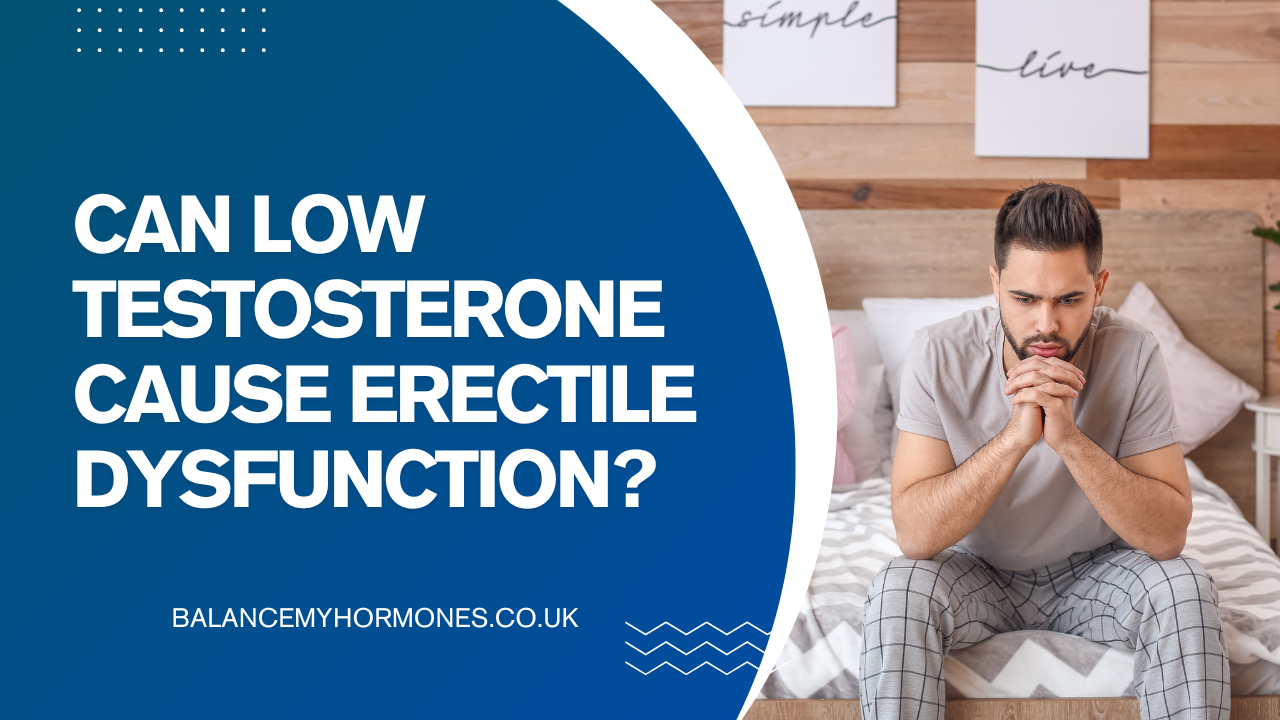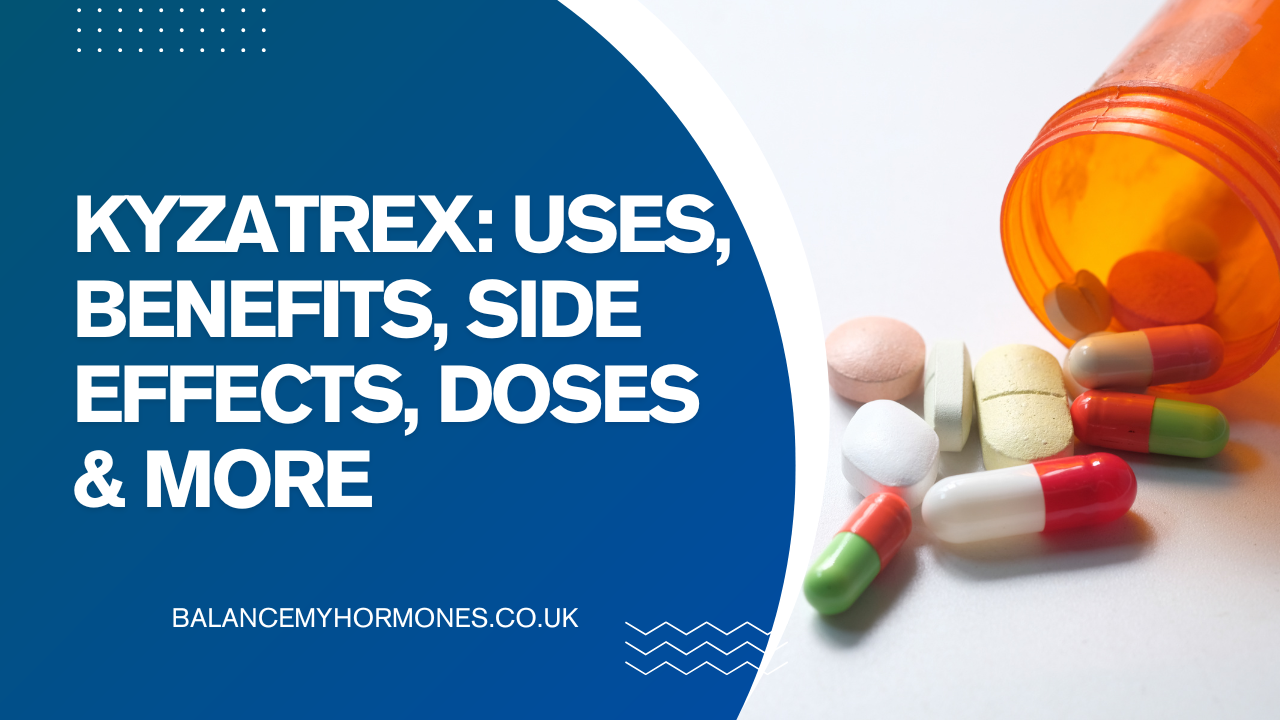
By Mike Kocsis | 7 minutes read | Last updated: October 9, 2025 Categories: Testosterone
Medically Reviewed by Dr. George Touliatos
Testosterone is an essential male sex hormone that’s involved in male sexual development and sex drive. Its low levels can disturb your sexual function and sex life in various ways and may also contribute to erectile dysfunction (ED).
Read on to learn how testosterone and erectile dysfunction are linked to each other and what treatment options are available for ED.
The connection between low testosterone and erectile dysfunction
If your body is not producing enough of the important hormone testosterone and your testosterone levels are below 300 nanograms per deciliter (ng/dL), you may have low testosterone (low T).
Men suffering from this condition often experience low libido (sexual desire) and trouble gaining an erection. Researchers have found that low testosterone can even have a negative effect on your sex life.
Testosterone is connected to erection in two ways:
- Testosterone stimulates the production of certain chemical messengers in the brain. A few examples of these messengers are dopamine, oxytocin, and nitric oxide. These chemicals are involved in achieving and gaining an erection.
- Testosterone also stimulates spinal nerves that bring changes to your blood vessels. These nerves send signals to the penis and make certain muscles relaxed. As a result, blood flow and pressure in your genitals increase, helping it expand and gain an erection.
Low testosterone can negatively influence your sex life, but it rarely causes erectile dysfunction.
Also, men with low T often have other chronic health issues as well, such as cardiovascular disease, type 2 diabetes and obesity, which can also contribute to ED.
There are numerous causes of ED, which often makes it challenging for the doctor to identify the real cause. Also, men with erectile dysfunction sometimes have normal testosterone levels, but they still have a problem achieving an erection.
That is why identifying the real cause before starting treatment is very important. If the cause is low testosterone levels, your doctor may suggest you have testosterone replacement therapy (TRT).
Other causes of erectile dysfunction
Erection problems can occur due to multiple reasons. That’s why your doctor will first identify the cause and then design a treatment plan accordingly. Here are the major causes of erectile dysfunction in men.
- Certain medical conditions such as high blood pressure, heart disease, type 2 diabetes, and testosterone deficiency (male hypogonadism)
- Certain medications such as tranquillisers, high blood pressure medicines, and antidepressants
- Psychological or emotional problems such as low self-confidence, anxiety, depression, and stress
- Poor lifestyle habits such as smoking, drinking, lack of physical activity, and excessive weight gain
- Age as ED is more common in aging men
How is erectile dysfunction diagnosed?
If you have trouble getting an erection, it is better to visit a healthcare provider and find a suitable treatment.
Your healthcare provider will start with questions and a physical examination. They will ask you questions about your lifestyle habits, current health condition, and medical history.
Here are some of the common questions that healthcare providers generally ask when diagnosing erectile dysfunction.
- Do you have an active lifestyle?
- Do you exercise?
- Do you smoke/drink? If yes, then how often?
- Do you take any medication?
- For how long have you been experiencing these symptoms?
After asking you questions and evaluating your condition through your answer, the doctor will conduct a physical examination.
Next, they may ask you to have a few lab tests, such as serum testosterone test, urine test, ultrasonography, pelvic x-ray, etc., to identify the underlying cause of the problem.
Erectile dysfunction hormone test
If you have other symptoms of hormonal imbalance and your doctor suspect that hormones may be the culprit behind your erectile difficulties, they will ask you to get a hormone test done.
An ED hormone test is like a simple blood test in which your blood sample is taken and sent to a lab for analysis.
Its report will show levels of important hormones like testosterone, luteinizing hormone (LH), follicle-stimulating hormone (FSH) and prolactin.
If your testosterone levels are below 300 ng/dL, you may have sexual activity issues like ED because of this hormone deficiency.
How to increase testosterone for erectile dysfunction?
If you have been diagnosed with erectile dysfunction caused by low T, then the most suitable treatment option for you might be testosterone replacement therapy.
It is a hormone replacement therapy in which you receive synthetic testosterone to boost your serum testosterone levels. You can have testosterone in different forms, such as pills, patches, pellets, injections, and gels.
Your doctor will determine your testosterone dose based on how low your testosterone levels are. Your dose will be adjusted throughout the treatment on the basis of how your body responds to the starting dose.
Many men have this treatment and report experiencing the following benefits.
- Improved erectile function and symptoms of erectile dysfunction
- Increase in energy levels
- Improved libido
- Improved sexual health
- Better mood
- Reduced depressive thoughts
- Improved self-esteem
- Increased muscle mass
Some low T men may need additional support of erectile dysfunction drugs known as PDE-5 inhibitors. Commonly used ED drugs are Viagra (sildenafil), Stendra (avanafil) and Cialis (tadalafil). These men may remain unresponsive to these drugs without undergoing testosterone therapy.
Who should not consider testosterone replacement therapy?
Though testosterone replacement therapy is a beneficial treatment, it comes with a few side effects that make it unsuitable for some people.
If you have congestive heart failure, sleep apnea, prostate cancer, benign prostate hypertrophy, and breast cancer, it is advised to not have testosterone replacement therapy as it can worsen your health condition
In such cases, doctors may suggest alternative approaches such as lifestyle changes (regular exercise, balanced diet, stress management, etc.) to men experiencing erectile dysfunction due to low T.
What are the other ways of treating erectile dysfunction?
If your ED is not caused by low T but other factors, your doctor may recommend one of the following treatment options:
- Oral drugs such as PDH5 inhibitors
- Urethra therapy in which a medicated pellet is placed in the urethra
- Vacuum erection device
- Surgical treatment in which an implant is inserted into the body. This option is considered when all the options mentioned above fail to work.
FAQs about testosterone and erectile dysfunction
Do steroids cause impotence?
Yes, the misuse of anabolic steroids can cause erectile dysfunction by disturbing the production of natural testosterone. Hence, it’s best to avoid steroids. Opt for safe treatments like hormone therapy if you want to improve your levels of testosterone.
What percentage of men have ED?
According to an old study (that’s often cited by experts), ED effects around 50% of men and its occurrence increases with age – from 5% to 15% between 40 to 70 years of age.
What age does erectile dysfunction start?
ED can occur at any age but there is no specific age at which we can say it starts. However, it becomes more common as men get older, with likelihood increasing after the age of 40.
How long does it take to recover from erectile dysfunction?
There is no set ED recovery time as it can vary from patient to patient based on the actual cause of the problem and their treatment approach.
Men with ED caused by medications and stress may recover within a few weeks after addressing triggers. On the other hand, men with ED due to hormonal imbalance may take months to show improvement.
Can taking testosterone cause erectile dysfunction?
Testosterone treatment generally helps ED in low T men. However, if you misuse it or stop it abruptly, you may experience temporary ED. Therefore, always work with your doctor to determine what’s the right treatment approach for you.
Can high testosterone levels also cause erectile dysfunction?
No, high testosterone levels are not linked to erectile dysfunction. However, bodybuilders who illicitly take testosterone may experience this issue as a side effect of taking testosterone when it is already present in their body within the normal range.
Conclusion
Erectile dysfunction can make a man feel less ‘manly’ and lead to low self-esteem. That is why, if you have this condition, you should not hesitate to talk about it with your doctor and find a solution.
Testosterone replacement therapy may be effective in reducing issues like sexual dysfunction, low sex drive and erectile dysfunction in most men with low T. Discuss the benefits and risks of TRT with your doctor to determine whether you are the right TRT candidate.
Books your free consultation with one of our professionals today to discuss your low testosterone and ED issues. Find a customized treatment to bring your low T levels within the normal range.
References
Schardein, J.N. and Hotaling, J.M., 2022. The impact of testosterone on erectile function. Androgens: Clinical Research and Therapeutics, 3(1), pp.113-124.
Corona, G. and Maggi, M., 2022. The role of testosterone in male sexual function. Reviews in Endocrine and Metabolic Disorders, 23(6), pp.1159-1172.
Onyeji, I.C. and Clavijo, R.I., 2022. Testosterone replacement therapy and erectile dysfunction. International journal of impotence research, 34(7), pp.698-703.
Evidence Based Research
This article has been researched and written based on scientific evidence and fact sheets that have then been crossed checked by our team of doctors and subject matter experts.
References, sources and studies used alongside our own in-house research have been cited below, most of which contain external clickable links to reviewed scientific paper that contain date stamped evidence.
Our team of healthcare experts and GMC registered doctors are licensed to UK GMC standards. We strive to provide you with the latest evidence based, researched articles that are unbiased, honest and provide you with accurate insights, statistics and helpful information on the discussed topic to ensure you gain a better understanding of the subject. You can read more about our Editorial Process by clicking here.
We value your feedback on our articles, if you have a well-researched paper you would like to share with us please contact us.
Quick Low Testosterone Test
If you know your total testosterone reading from a previous blood test input the results to the left above to see if your testosterone levels are normal.
Low Testosterone Levels
You may have low testosterone depending on the symptoms you have, please contact us to find out how we can help.
Please Retry
The Total Testosterone Level You Entered Is Incorrect. Figure Must be in nmol/L you can use our converter here.
Normal Testosterone Levels
Your testosterone levels appear to be in the normal range.
LOOKING GOOD!
You must be over 38, have had your ovaries removed or have suffered with premature menopause to warrant further hormone tests.
Further investigation needed
Please contact us to discuss your hormones, we need your total testosterone levels to validate your hormone deficiency. You can order a blood test here.
Low Testosterone Levels
You may have low testosterone depending on the symptoms you have, please contact us to find out how we can help.
High Testosterone Levels
You appear to have higher than normal testosterone levels, please contact us for further investigation.
Normal Testosterone Levels
You appear to have normal testosterone levels. Contact us if you have any concerns.
 Mike Kocsis has an MBA with a focus on healthcare administration and is an entrepreneur and medical case manager for Balance My Hormones which offers medical services in the UK and Europe. Mike has over 20 years of experience in the healthcare sector, much of that working with people who have hormone imbalances. Mike has appeared on
Mike Kocsis has an MBA with a focus on healthcare administration and is an entrepreneur and medical case manager for Balance My Hormones which offers medical services in the UK and Europe. Mike has over 20 years of experience in the healthcare sector, much of that working with people who have hormone imbalances. Mike has appeared on 

